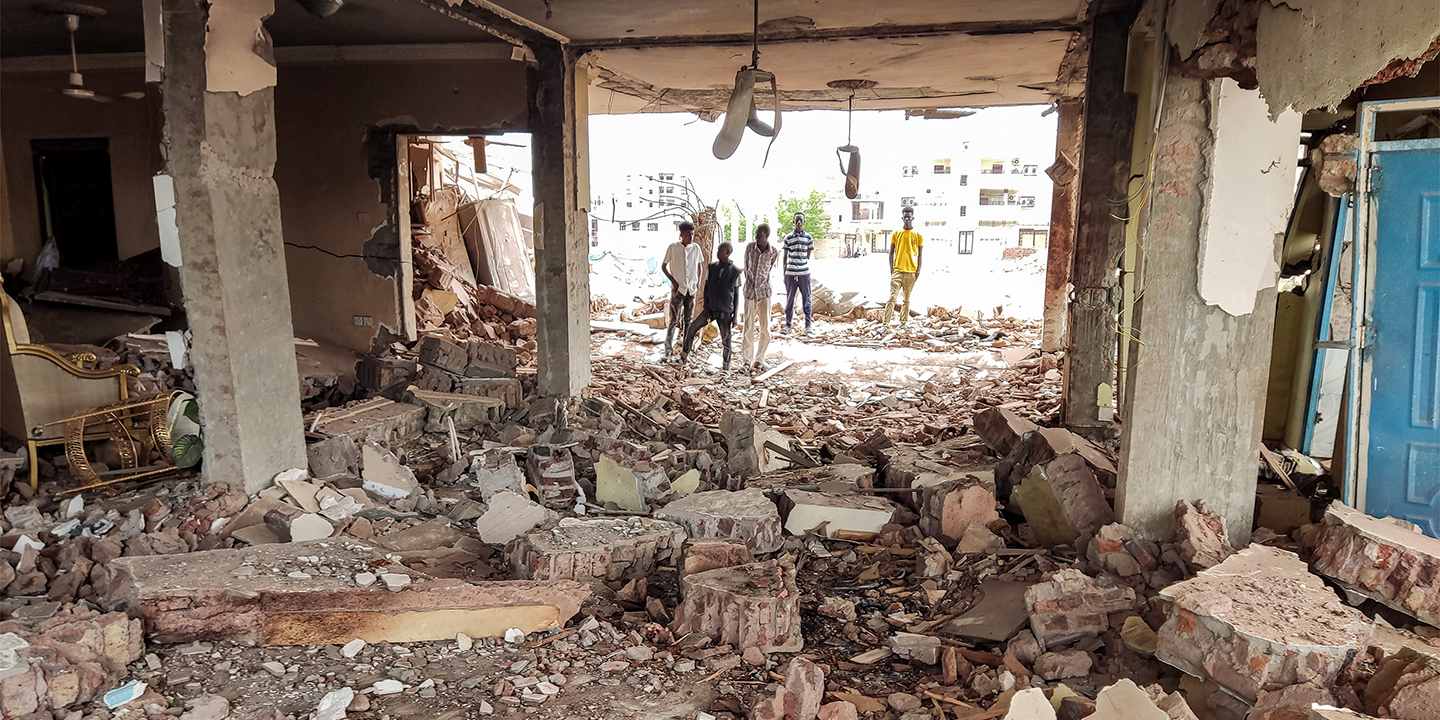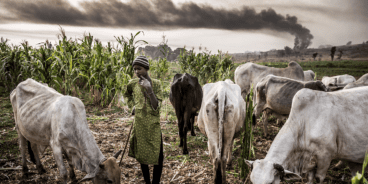

Atrocity Alert No. 350: Sudan, El Salvador and Rwanda
Atrocity Alert is a weekly publication by the Global Centre for the Responsibility to Protect highlighting situations where populations are at risk of, or are enduring, mass atrocity crimes.
FIGHTING ESCALATES IN SUDAN AFTER CEASEFIRE OFFICIALLY COLLAPSES
Clashes between the Rapid Support Forces (RSF) and the Sudanese Armed Forces (SAF) have intensified in parts of Sudan since the suspension of peace talks in Saudi Arabia on 1 June. The SAF suspended the peace talks after accusing the RSF of violating a short-term ceasefire agreement, which entered into force on 22 May, as well as for a lack of commitment to end the violence. Although the ceasefire resulted in a temporary decrease of fighting, it was violated by both sides as were all other truces agreed upon thus far. In the deadliest single event since the outbreak of the violence on 15 April, heavy artillery and airstrikes killed at least 27 people and injured more than 106 around a market in Mayo in southern Khartoum the day that the talks collapsed.
Since then, the RSF has started to reposition itself across Khartoum and is terrorizing, kidnapping and killing civilians, looting homes and raping women and girls. Analysts and residents believe that the SAF is preparing to wage a major offensive to retake the capital from the RSF. Fighting continues to escalate in other parts of the country as well, including in El Obeid, North Kordofan, where the RSF reportedly burnt down entire neighborhoods, killed civilians and destroyed property. In Kutum, North Darfur, at least 40 people were killed and dozens more injured following attacks by the RSF on 2-3 June.
In his briefing to the UN Security Council on 22 May the Special Representative of the Secretary-General on Sudan, Volker Perthes, said, “In Khartoum, Darfur and elsewhere, the warring parties have fought their war with little regard for the laws and norms of war.” Seven weeks into the fighting, the humanitarian and human rights situation across Sudan has significantly deteriorated and the ceasefire did not help facilitate much-needed humanitarian relief to the millions of people trapped in Khartoum. At least 866 people have been killed and thousands injured since 15 April. An estimated 1.4 million people have been internally displaced by the fighting while an additional 476,811 have fled to neighboring countries.
Civilians are facing an imminent risk of atrocity crimes as the conflict enters a new phase. Both military factions must respect International Humanitarian Law. It is essential that humanitarian organizations are allowed safe and unhindered access to deliver aid to vulnerable populations and alleviate the developing humanitarian crisis. The international community has a crucial role to serve in helping to de-escalate the situation, including by exerting maximum diplomatic pressure to secure a permanent ceasefire. The international community should also scale up its humanitarian response and ensure a credible political transition that respect people’s desire for democratic reform.
AT LEAST 153 DEATHS IN CUSTODY UNDER EL SALVADOR’S STATE OF EMERGENCY
On 2 June Cristosal, a non-governmental human rights organization, reported that between March 2022 and April 2023 at least 153 individuals jailed by state authorities in El Salvador have died in custody as a result of torture and serious and systematic injuries. Almost half of the victims are believed to have suffered violent deaths, with nearly one-fifth of these deaths “caused by conditions indicating deliberate negligence in the provision of health care, medicine and food, including deaths caused by malnutrition.” Cristosal warned that ongoing serious violations and abuses, including torture by prison guards and other state officials, are carried out as a state policy authorized at the highest level of government with the deliberate and systematic targeting of a “specific segment of the population, including mostly young residents of communities in conflict.” Cristosal further warned that these violations and abuses may amount to crimes against humanity.
Since March 2022 Salvadoran authorities have imposed and regularly extended a state of emergency to allegedly curb gang violence. Under the state of emergency, President Nayib Bukele has led and overseen a systematic policy of mass arrests and related torture and ill-treatment, as well as enforced disappearances. These violations and abuses have been facilitated by the deliberate dismantling of democratic institutions and control over the country’s legislature and judiciary during President Bukele’s tenure. According to the Office of the UN High Commissioner for Human Rights (OHCHR), at least 68,000 individuals have been detained over the past fourteen months. Many of the arrests are presumed to be arbitrary as state agents target individuals without any evidence of gang involvement. Detainees are deliberately denied due process rights or other procedural safeguards.
Family members and relatives of victims have repeatedly expressed fear of reprisals from state authorities for sharing information with non-governmental organizations. OHCHR documented at least 182 incidents against human rights defenders in 2022 alone. On 14 April El Faro – a well-known independent news outlet – announced its relocation to Costa Rica as a result of ongoing harassment.
On 2 June OHCHR called upon authorities to lift the state of emergency and ensure independent investigations into the deaths in custody. At the upcoming session of the UN Human Rights Council, beginning on 19 June, member states should reiterate these concerns, highlight the deteriorating human rights crisis in El Salvador and exert maximum pressure on President Bukele and his government to end systematic state-led repression and halt the commission of possible crimes under international law.
RWANDAN GENOCIDE FUGITIVE ARRESTED IN SOUTH AFRICA
On 24 May authorities in South Africa arrested Fulgence Kayishema, a former senior police officer and one of the world’s most wanted suspects of the 1994 Rwandan genocide. Between April and July 1994 approximately one million ethnic Tutsis were murdered in Rwanda over a period of 100 days. During the genocide Kayishema allegedly orchestrated the killings of more than 2,000 Tutsi men, women and children on 15 April 1994 at the Nyange church in Kivumu commune, Kibuye prefecture. Hutu militia – reportedly under his command – lobbed grenades then distributed petrol to set the church ablaze. When this failed, the perpetrators used a bulldozer to knock down the church, burying and killing the people seeking refuge inside.
In 2001 the International Criminal Tribunal for Rwanda (ICTR) indicted Kayishema and charged him with genocide, complicity in genocide, conspiracy to commit genocide and crimes against humanity for killings and other crimes committed in Kivumu. Since his indictment Kayishema had evaded arrest – living as a fugitive in South Africa – and had never been brought to trial by the ICTR. Before closing in December 2015, the ICTR had sentenced 62 people for genocide and other crimes, including high-ranking military and government officials, businessmen, as well as religious and militia leaders. The tribunal was succeeded by the International Residual Mechanism for Criminal Tribunals (IRMCT). Kayishema is now facing proceedings in the South African court system. Rwanda’s Public Prosecution Authority reportedly told the media that Kayishema is expected to be transferred to the IRMCT, then to Rwanda for trial.
The UN Special Adviser on the Prevention of Genocide, Alice Wairimu Nderitu, issued a statement welcoming the arrest and stated, “Accountability serves not only as a deterrent for future crimes but it also helps advance reconciliation and the healing of societies from the trauma of genocide and other atrocities. It also contributes to ensuring respect for the dignity of the victims and their families.”
Meanwhile, Félicien Kabuga – another alleged mastermind of the genocide who was arrested in France during May 2020 – was deemed unfit to stand trial on 7 June. Kabuga was an influential businessman and a founding director of Radio-Télévision Libre des Mille Collines, the radio station that played a central role in inciting the genocide. Rather than halting the trial, the judges said they would set up an “alternative finding procedure that resembles a trial as closely as possible, but without the possibility of a conviction.”
Twenty-nine years after the end of the genocide in Rwanda, Kayishema’s arrest should signal to all perpetrators of atrocity crimes that they cannot rely upon the permanence of impunity, regardless of how powerful they may currently seem or where they might hide. Despite the passage of time, the victims and survivors deserve to see all those responsible for crimes committed during the 1994 Rwandan genocide arrested and prosecuted in fair and credible trials.
Related Content


Atrocity Alert No. 444: Nigeria, Haiti and South Sudan
